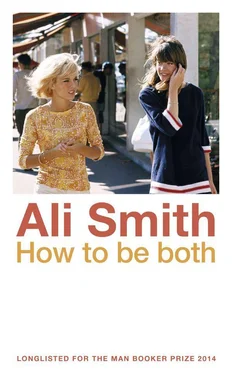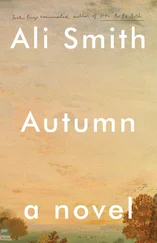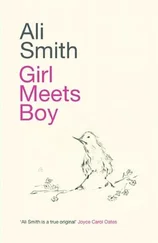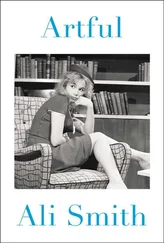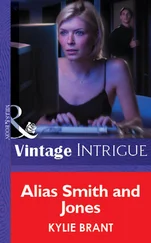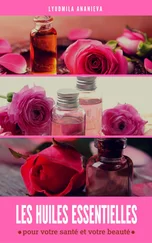Cause I met many female Marses and Joves in the house and many Venuses and Minervas in and out of all sorts of clothes.
None of them earned anywhere near her true worth in money: all of them suffered misuse, at the very least the kind of everyday misuse you hear any night through the walls of such a house, and though these women and girls were the closest thing alive I ever met to gods and goddesses, the work they did would first pock them on the surface like illness then break them easy as you break dry twigs then burn them up faster than kindling.
Ginevra I heard died in one of the blue sicknesses.
Isotta, my darling one, vanished.
I liked to think she went by her own choice.
I liked, after I heard she’d gone, to see her in my head fine and hearty in a small town or village, living in a house that was strong at the roof under vines and figs and lemon trees in a noise of the good unruliness of a mob of her own children: most of all I liked to think her smiling with her eyes and mouth both (which means love) at a lover or friend or at least at someone whose money she shared equally.
Agnola I heard years later was found in the river tied at the hands and feet.
So I understood plenty of dark things too, learned plenty of things that were the opposite of pleasure, at the pleasure house.
Then the end of my time there did come, after all, in our 18th year of age cause Barto had commerce with Meliadusa, young, new to the house, new to the work, who’d had me the fortnight before, first, on her arrival, and had let it slip with her guests the next few times after me that what she expected in this house was something better: to be brought to good climax regardless of what they wanted, then to be allowed to sleep for a bit, and finally to be given, in exchange for the night’s work, a very fine drawing of herself.
She told Barto laughingly about it a fortnight of work in the pleasure house later when she found it very funny that she’d been so misconstruing and that the reality of life in the pleasure house was so other.
It wasn’t all she laughingly told him.
Barto sat opposite me on the grass: it was early morning: carts were coming into the city to market behind him: he rubbed at his jaw: he was solemner than a bear: he’d maybe had a bad night, bad supper, maybe bad wine.
What? I said.
Be quiet, he said.
He leaned forwards, took one of my boots in his hands: he untied the laces and straps: he took the boot off my foot: he untied the boot on the other foot: he took it off me: he stood my boots to one side: he unsheathed his knife from his pouch: very careful with the blade not to cut me in the skin and the blade cold where it touched me, he nicked its point through my leggings at the ankle and cut in a circle all round first one, then the other.
He peeled the legging-stuff off each foot: he placed both pieces to one side: he took my bare feet in his hands: then he spoke.
Is it true? he said. You’ve been false? All these years?
I have never not been true, I said.
Me not knowing, he said. You not you.
You’ve known me all along, I said. I’ve never not been me.
You lied, he said.
Never, I said. And I have never hidden anything from you.
Cause there’d been many times when Barto’d seen me naked or near-naked, by ourselves swimming, say, or with other boys and young men too and the general acceptance of my painter self had always meant I’d been let to be exactly that — myself — no matter that in 1 difference I was not the same: it was as simple as agreement, as understood and accepted and as pointless to mention as the fact that we all breathed the same air: but there are certain things that, said out loud, will change the hues of a picture like a too-bright sunlight continually hitting it will: this is natural and inevitable and nothing can be done about it: Barto had been challenged by someone, concerning me, and he had been humiliated by the challenge.
You are other than I thought, he said.
I nodded.
Then the fault is with your thinking, or with the person who has changed your thinking, not with me, I said.
How can we be friends now? he said.
How can we ever not be friends? I said.
You know I marry in the summer, he said.
That you marry makes no difference to me, I said and this is the last thing I said that day to him cause he looked at me then with eyes like little wounds in his head and I understood: that he loved me, and that our friendship had been tenable on condition that he could never have me, that I was never to be had, and that someone else, anyone else, saying out loud to him what I was, other than painter, broke this condition, since those words in themselves mean the inevitability, the being had.
His hands were cold and my feet in them: he put my feet down on the grass, stood up, touched his chest where his collarbone was (cause my friend was quite the dramatist always) and turned his back on me.
I looked down at my own feet: I looked at how my taken-off boots held the foot shapes even though there weren’t any feet in them: I searched around for the legging-stuff after Barto left but I couldn’t find it: so I pulled my boots back on my bare feet, strapped and tied them on.
I walked round Bologna for a bit: I had a look at some churchwork, some that was finished and some being done in the early morning light, cause I was a painter before I was anything else, including a friend.
Then I went home to my father in Ferara and told him our chances of Garganelli patronage were over.
What did you do wrong? he shouted,
cause first he was furious: then he was all pride puffed up, all no child of mine will prostitute itself : in his fury my father looked old to me for the first time, so I took off my boots and looked at my feet which had blistered from the walking all day with nothing between skin and leather: the blisters were like little balls of unclear glass surfacing in the skin of me: how would I paint such opaqueness? What kind or what making of white would it take?
Even as I thought it I felt white all over at the loss of my friend and thought that I’d never know other colours again.
Funny to think of it now, that bleak evening: cause the biggest patrons of my short life were after all to be the Garganelli family, and the reason I couldn’t find the legging-stuff was that my friend Barto had rolled it in his hand and put it in his pocket and taken it as souvenir, as he told me years later sitting on the stone step by my feet while I worked on the decoration for the tomb of his father in their chapel.
Girl: do you hear me?
cause although it seemed to be the end of the world to me –
it wasn’t.
There was a lot more world: cause roads that look set to take you in one direction will sometimes twist back on themselves without ever seeming anything other than straight, and Barto and I were soon friends again: no time at all: many things get forgiven in the course of a life: nothing is finished or unchangeable except death and even death will bend a little if what you tell of it is told right: we were friends until I died (if I did die ever, cause I remember no death) and I trust that he remembered me lovingly till the day he died himself (if he did, cause I have no memory of such a thing).
I am watching the girl watch an old old story, the performance of love through a too-small window: yesterday it was the theatre of saints, today it’s love: albeit love performed for an audience: but an audience is only ever really interested in its own needs regardless, whoever you were or are, Cosmo, Lorenzo, Ercole, School of Unknown Painters of Ferara Workshop: I forgive.
Cause nobody knows us: except our mothers, and they hardly do (and also tend disappointingly to die before they ought).
Читать дальше
